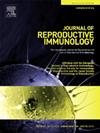Immunological effects of GLP-1 analogs on female reproduction: Therapeutic perspectives for infertility and recurrent pregnancy loss
IF 2.9
3区 医学
Q3 IMMUNOLOGY
引用次数: 0
Abstract
This review evaluates the role of glucagon-like peptide-1 receptor agonists (GLP-1RAs) in treating obesity-related infertility and recurrent pregnancy loss (RPL). Originally developed for managing type 2 diabetes mellitus (T2DM) and obesity, GLP-1RAs demonstrate potential in improving reproductive outcomes through their metabolic, vascular, and immunological effects. Obesity, a significant contributor to infertility and RPL, disrupts endocrine balance, promotes chronic inflammation, and impairs endometrial receptivity. GLP-1RAs alleviate these challenges by facilitating substantial weight loss, enhancing insulin sensitivity, and modulating immune responses. Research suggests that the immunological benefits of GLP-1RAs extend beyond their weight-loss effects. Key mechanisms associated with their impact on reproductive outcomes include macrophage polarization toward an anti-inflammatory phenotype, suppression of pro-inflammatory cytokine production, and restoration of maternal-fetal immune tolerance through increased regulatory T-cell activity. Emerging evidence highlights their role in enhancing vascularization and reducing oxidative stress at the maternal-fetal interface, critical processes for implantation and placental development. Despite these promising benefits, the use of GLP-1RAs during pregnancy remains contraindicated due to safety concerns. While they show promise in preconception protocols, further clinical trials are needed to establish their efficacy and safety in reproductive health. This review underscores the potential of GLP-1RAs as a multidimensional approach to managing infertility and RPL, particularly in obese women, and advocates for their integration into personalized therapeutic strategies to optimize reproductive outcomes.
GLP-1类似物对女性生殖的免疫作用:不孕症和复发性流产的治疗前景
本文综述了胰高血糖素样肽-1受体激动剂(GLP-1RAs)在治疗肥胖相关不孕症和复发性妊娠丢失(RPL)中的作用。GLP-1RAs最初用于治疗2型糖尿病(T2DM)和肥胖,通过其代谢、血管和免疫作用,显示出改善生殖结局的潜力。肥胖是导致不孕和RPL的重要因素,它破坏内分泌平衡,促进慢性炎症,损害子宫内膜容受性。GLP-1RAs通过促进体重减轻、增强胰岛素敏感性和调节免疫反应来缓解这些挑战。研究表明,GLP-1RAs的免疫益处超出了它们的减肥作用。与它们影响生殖结果相关的关键机制包括巨噬细胞向抗炎表型的极化,抑制促炎细胞因子的产生,以及通过增加调节性t细胞活性恢复母胎免疫耐受。新出现的证据强调了它们在增强母胎界面血管化和减少氧化应激中的作用,这是植入和胎盘发育的关键过程。尽管有这些有希望的好处,但出于安全考虑,妊娠期间使用GLP-1RAs仍然是禁忌。虽然它们在孕前治疗方案中显示出希望,但需要进一步的临床试验来确定它们在生殖健康方面的有效性和安全性。本综述强调了GLP-1RAs作为治疗不孕症和RPL的多维方法的潜力,特别是在肥胖妇女中,并倡导将其纳入个性化治疗策略以优化生殖结果。
本文章由计算机程序翻译,如有差异,请以英文原文为准。
求助全文
约1分钟内获得全文
求助全文
来源期刊
CiteScore
6.30
自引率
5.90%
发文量
162
审稿时长
10.6 weeks
期刊介绍:
Affiliated with the European Society of Reproductive Immunology and with the International Society for Immunology of Reproduction
The aim of the Journal of Reproductive Immunology is to provide the critical forum for the dissemination of results from high quality research in all aspects of experimental, animal and clinical reproductive immunobiology.
This encompasses normal and pathological processes of:
* Male and Female Reproductive Tracts
* Gametogenesis and Embryogenesis
* Implantation and Placental Development
* Gestation and Parturition
* Mammary Gland and Lactation.

 求助内容:
求助内容: 应助结果提醒方式:
应助结果提醒方式:


